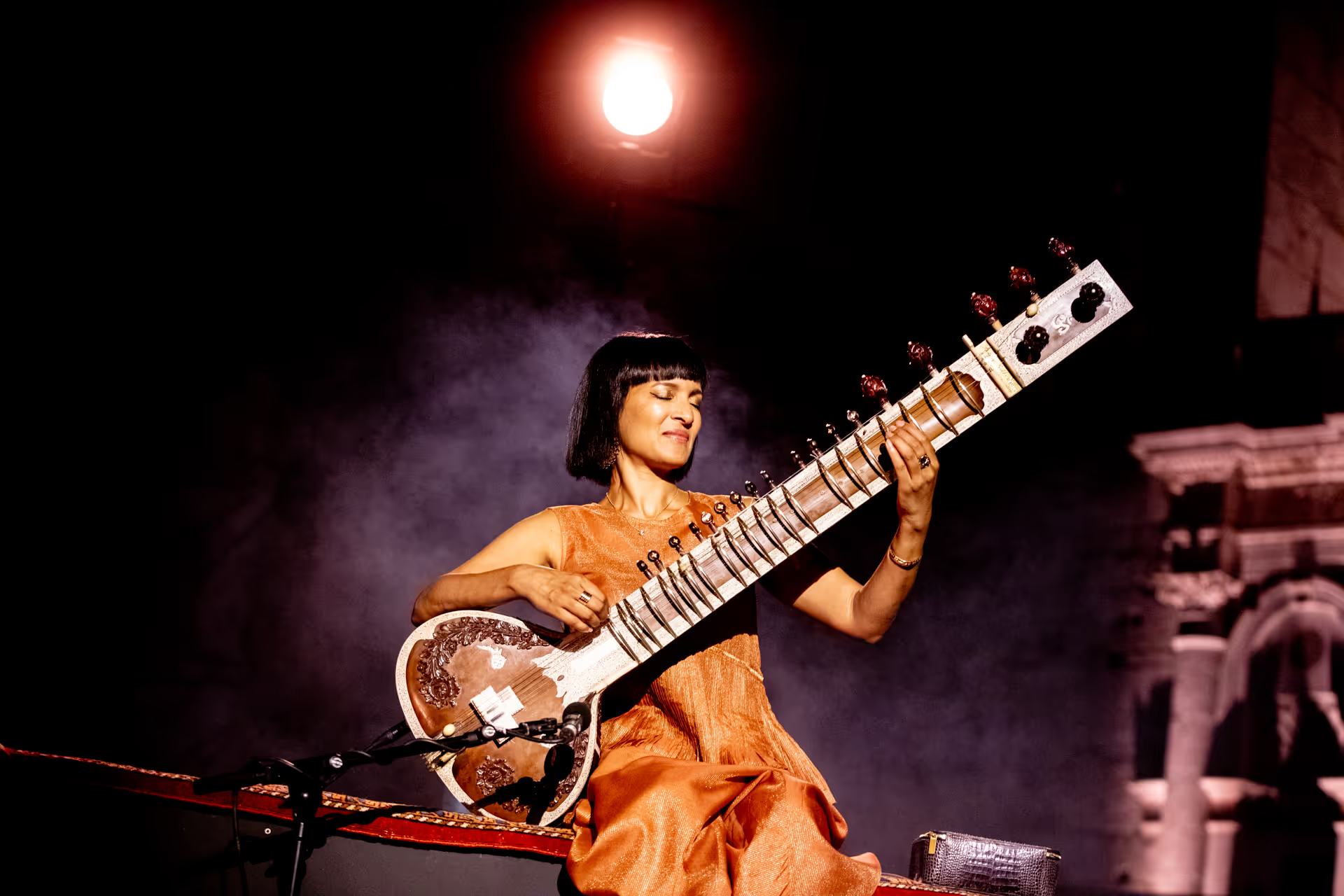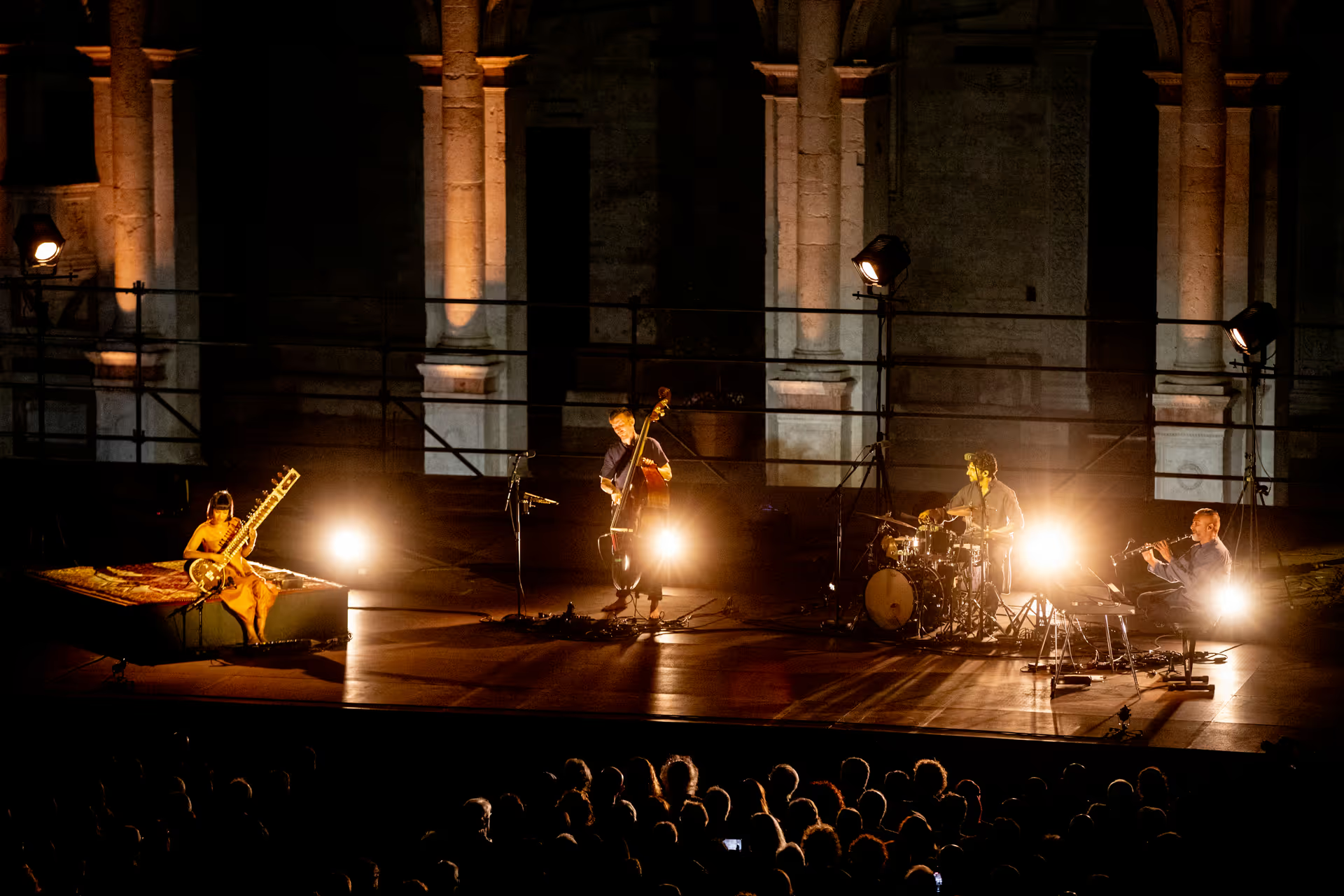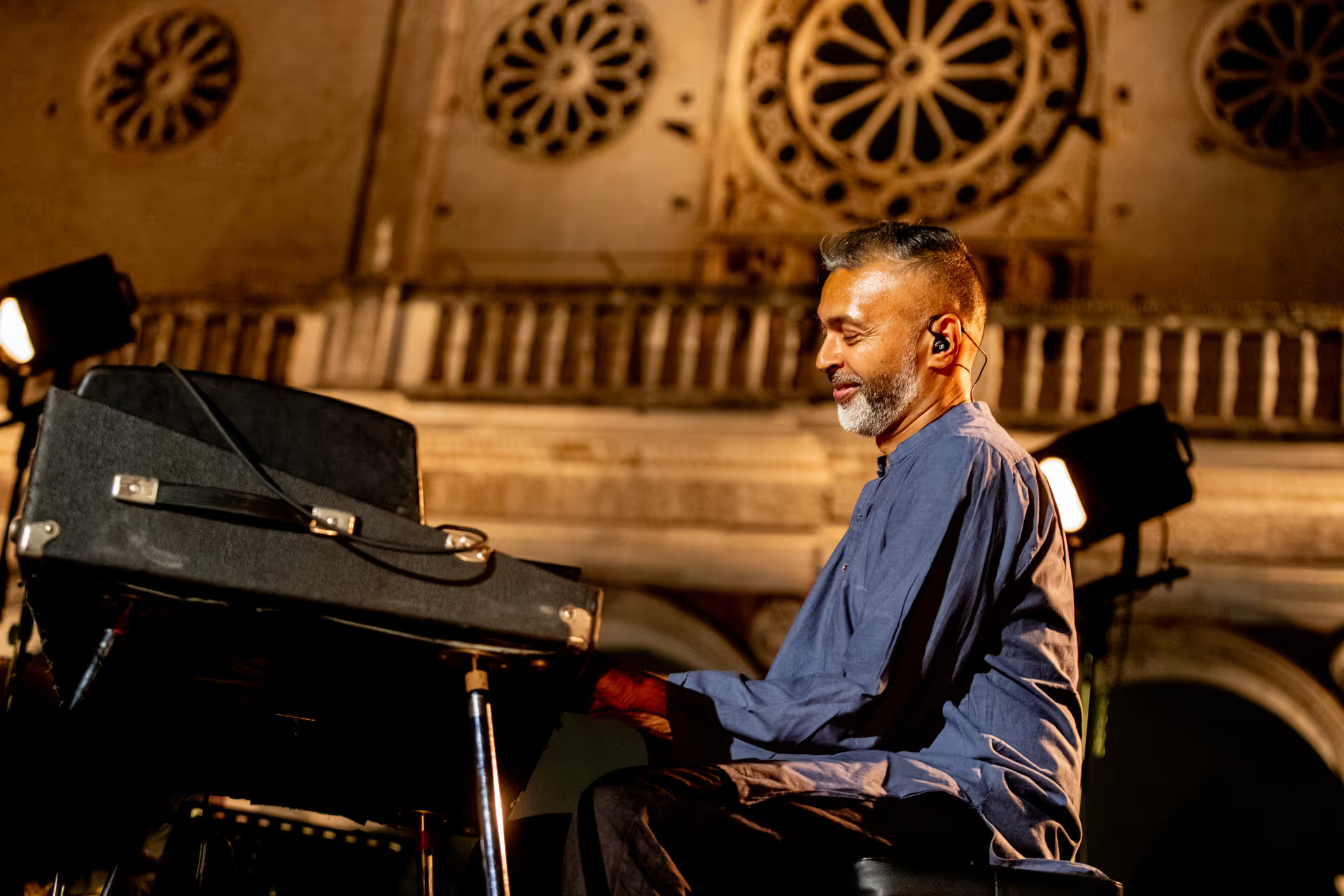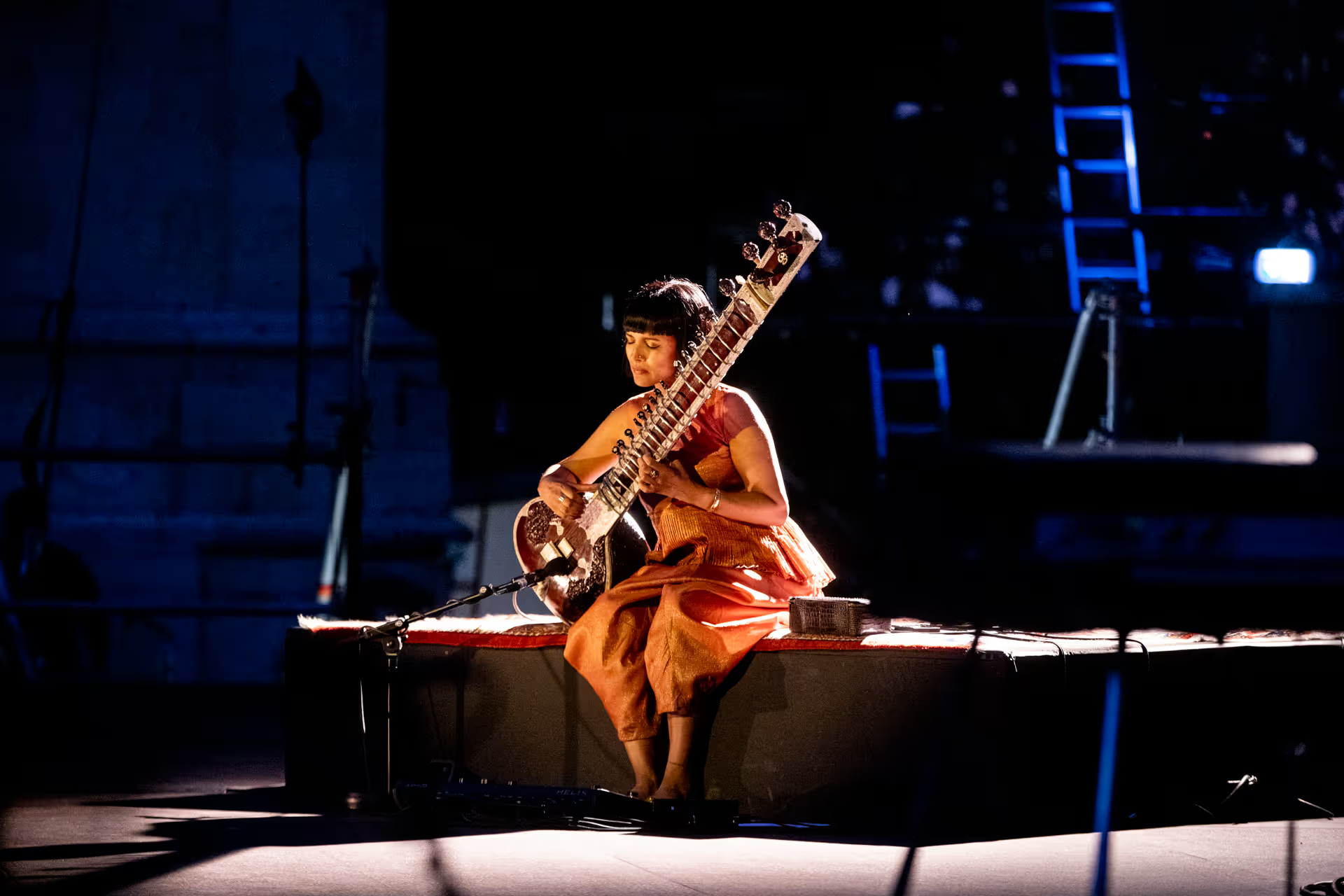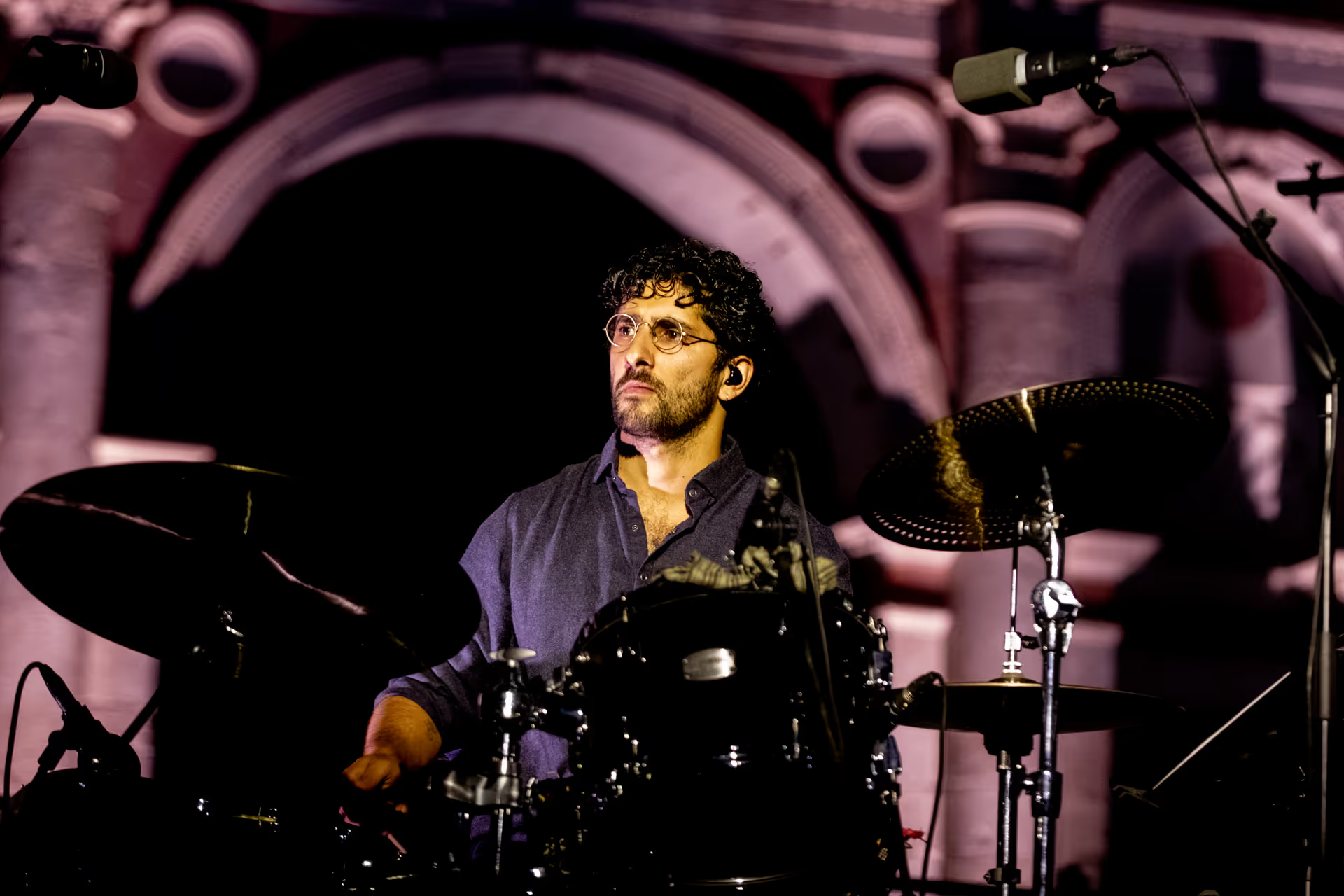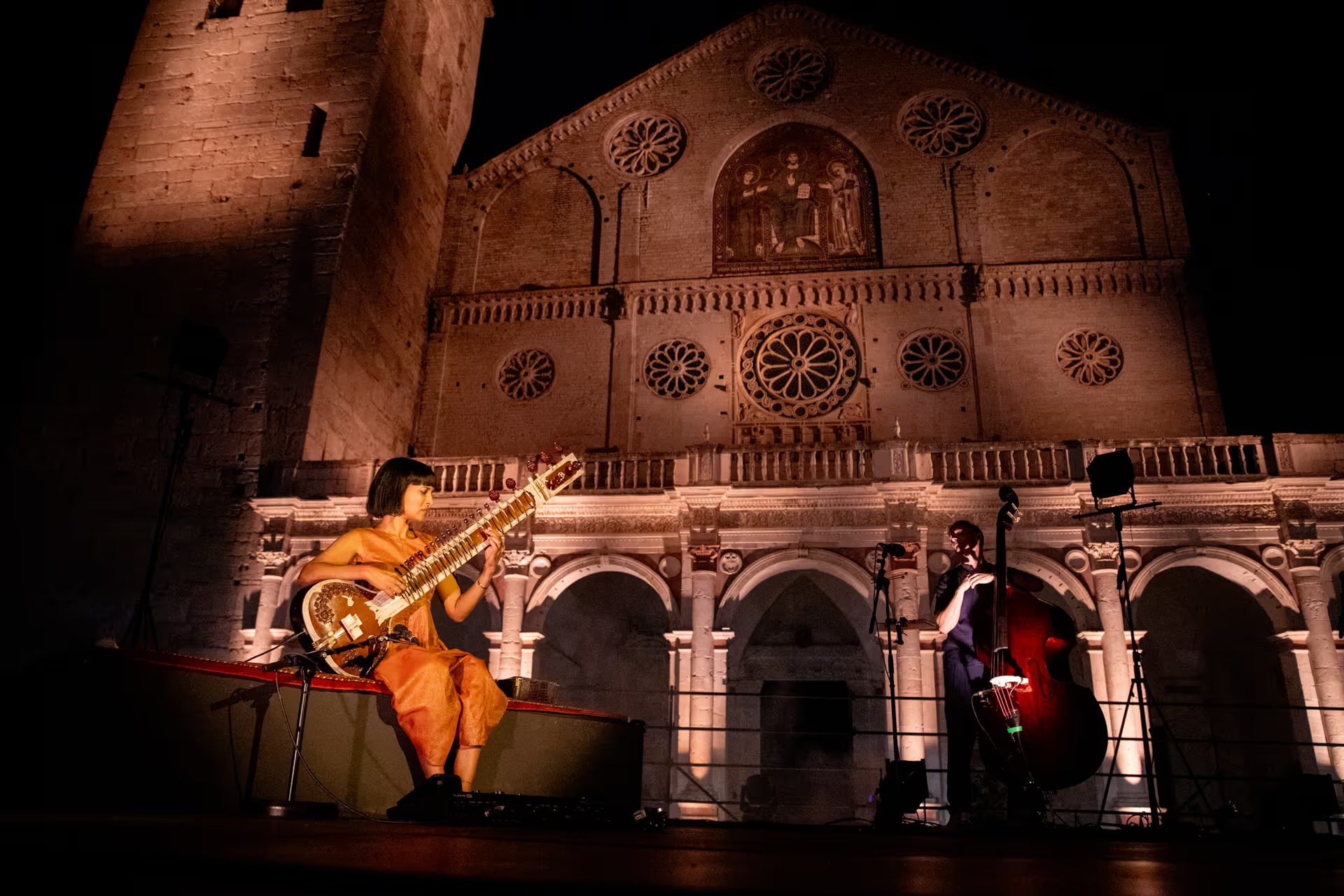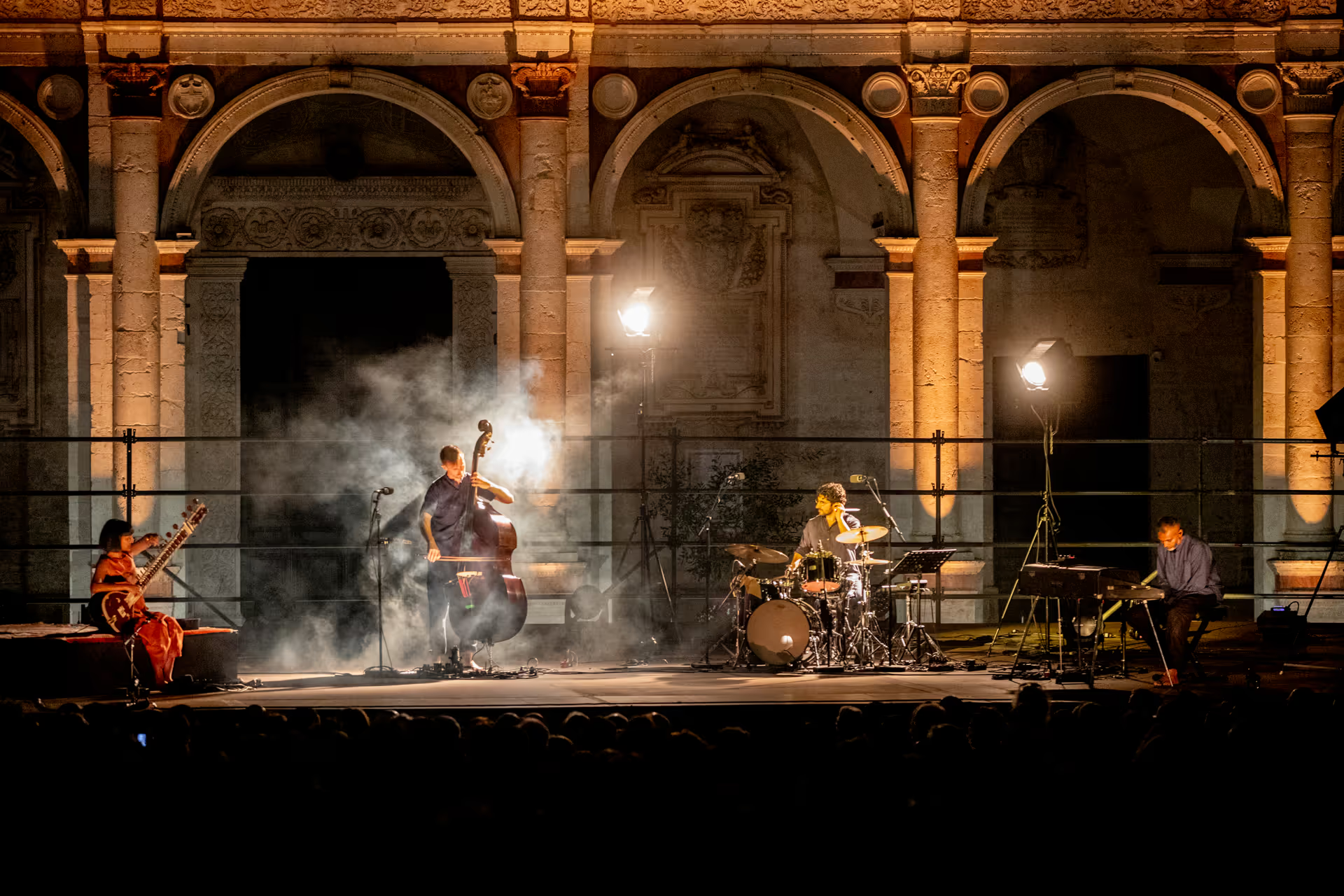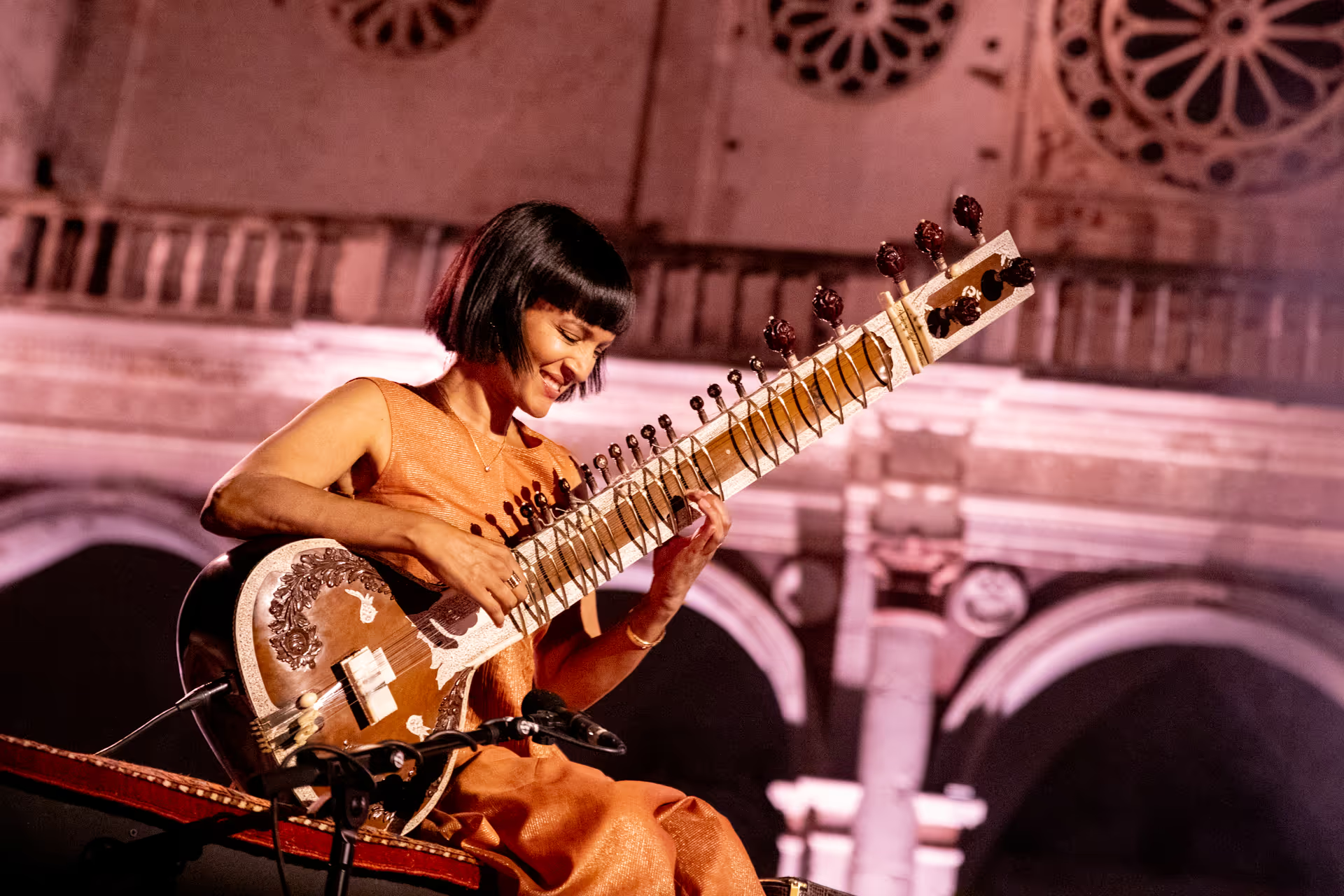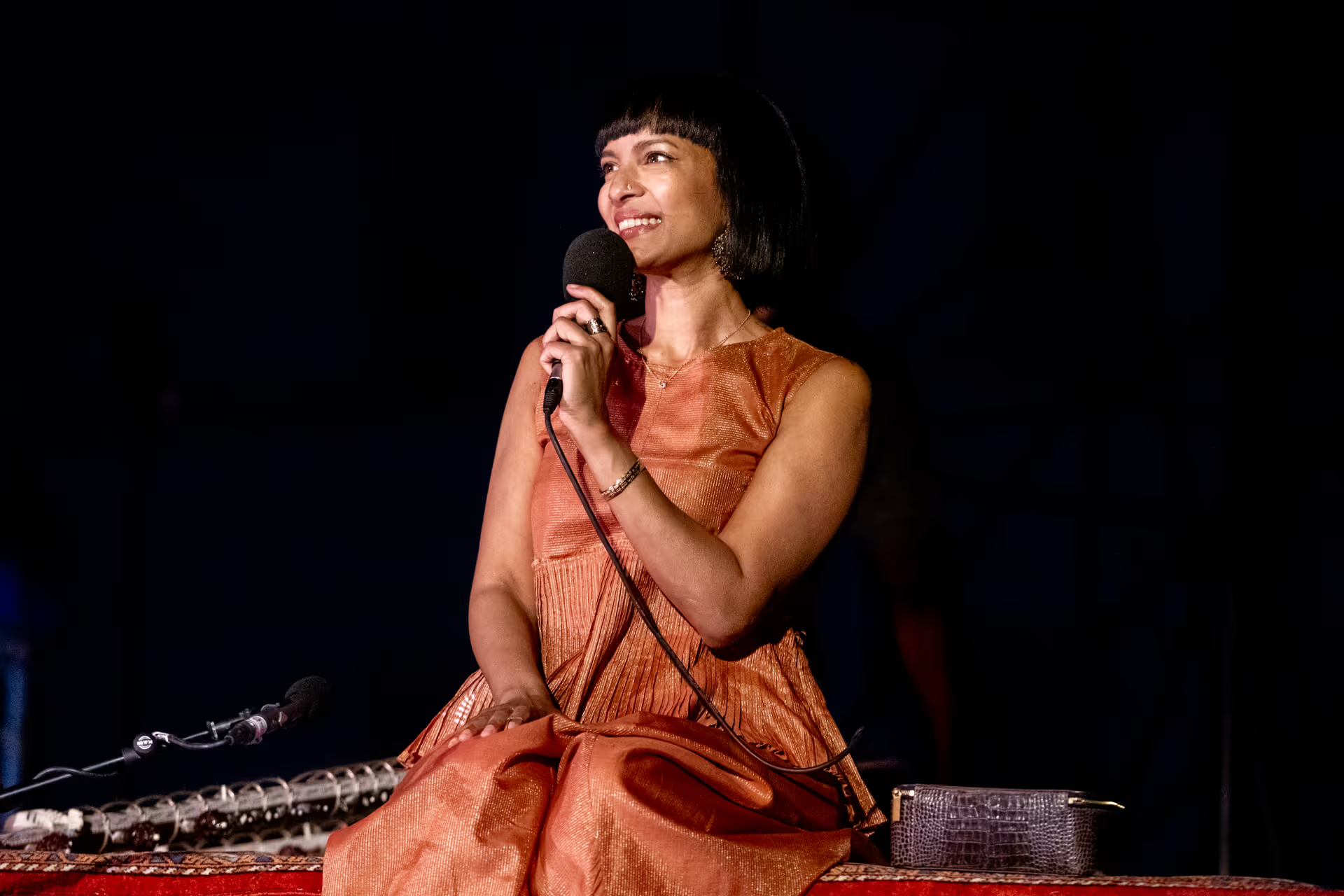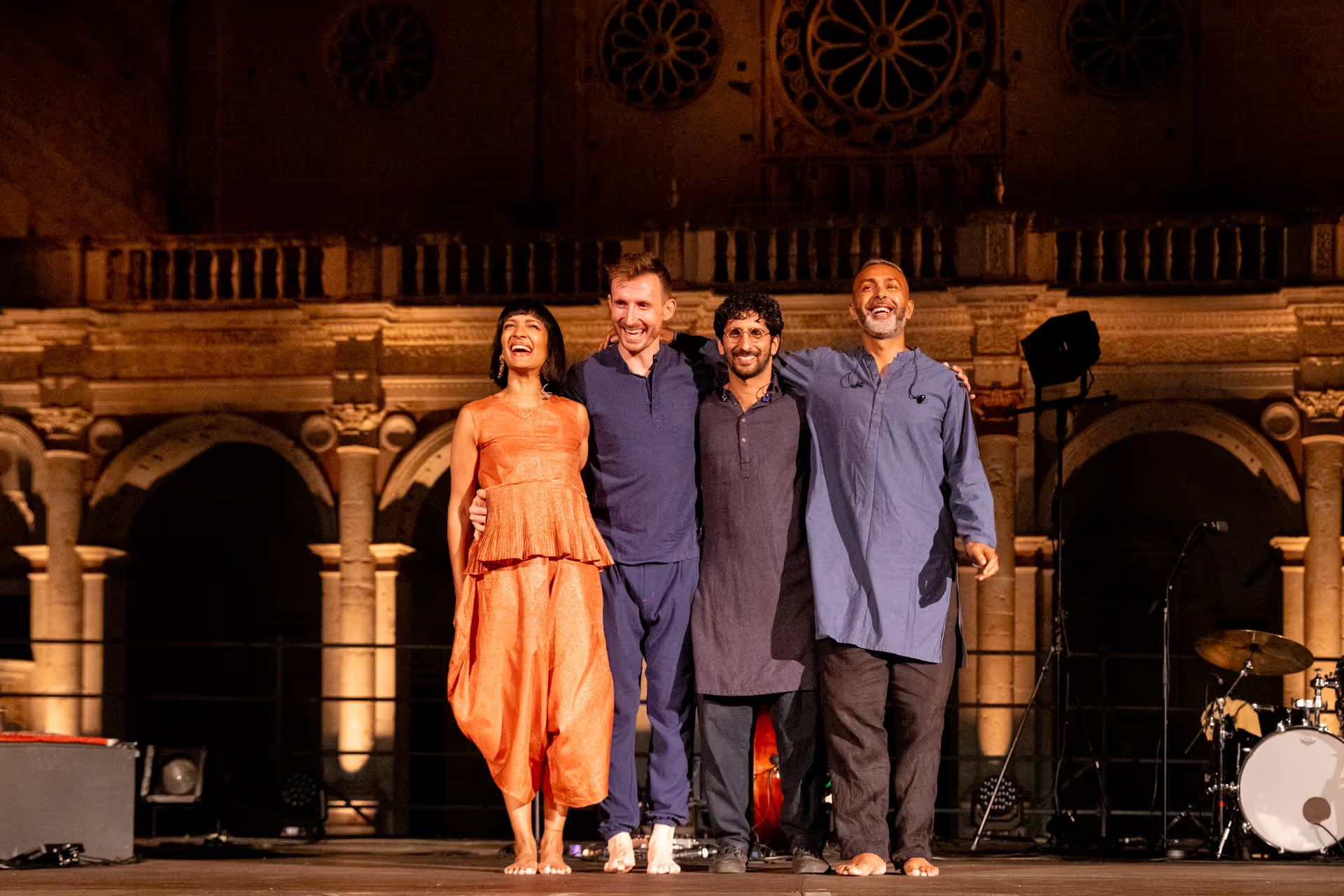Synopsis
Anoushka Shankar marks the culmination of her recent trilogy of mini-albums: Chapter I: Forever, For Now, Chapter II: How Dark it Is Before Dawn and Chapter III: We Return to Light with a visionary new live show. Written and released back-to-back during two years of an experimental, creatively-charged global tour of an ever-evolving programme, the performance of each Chapter infused the composition of the next. After first exploring the transient, bittersweet joy of a summer afternoon on Chapter I and an immersion into a healing, womblike night on Chapter II, Chapter III completes the cycle, leading audiences through each movement and into the strong, golden heat of morning- a time of strength, wisdom and change.
With 30 years’ performance since her teenaged debut, eleven Grammy nominations and an Honorary Degree in Music from Oxford University under her belt, Anoushka has spent her career redefining the conventions of the sitar. Alongside an ensemble celebrated for their endless virtuosity, sensitivity and ear for improvisation, this show sees Anoushka expand the vocabulary of her sitar, looping and bending sound to create a bold new Indo-futurist vision for her music
Credits
Programma
Sitar Anoushka Shankar
clarinet and keyboards Arun Ghosh
double bass Tom Farmer
drums and percussion Yusuf Ahmed
sound design James Campbell, John Ducket
light design Eric Collignon
Italian premiere


.avif)


.avif)
INFORMATION
Please note that dates and times may change.
For updates consult the website www.festivaldispoleto.com
Program
The Prophetess of the Sitar: Anoushka Shankar
by Alceste Ayroldi
It is hard to begin speaking about Anoushka Shankar without falling into the cliché: she is the daughter of a legend. And yet it must be said, because if Ravi Shankar brought the sound of the sitar to the world (thanks to George Harrison and Woodstock) and gave new musical life to the hippie movement of the Seventies, he also inscribed music and this instrument indelibly into the soul of his beloved daughter.
That said, the sitar has now entered the Western cultural sphere, thanks to globalization (praiseworthy in this case), and can now be heard in chill-out, rock, pop, and even techno tracks; not to mention that Wherever I May Roam by Metallica opens with a striking sitar intro.
The sitar is a significant instrument in Indian classical music, and, as historians suggest, it derives from the Iranian setar and shows kinship with the zither and the lyre. It has eighteen strings in total (seven on top and eleven below), making it difficult to learn and master: a philosophical mindset is required to approach it—this instrument is not for everyone. It is played using a plectrum (called a mizrab) worn on the index finger of the right hand. The mizrab is generally made of metal and allows for precise plucking of the strings. We need not go into further technical detail here, but this introduction serves to highlight the skill and sensitivity of Anoushka Shankar. It is worth noting from the outset that she is the stepsister (a term far less harsh in English than in Italian) of Norah Jones (Ravi had a relationship with singer Sue Jones). The two sisters collaborated on the album Traces of You (2013), with Norah Jones singing on three exquisite tracks.
Anoushka, born in London, is a vital part of the city's music scene—undoubtedly one of the most vibrant in terms of innovation. Despite her young age, she has already published an autobiography: Bapi: The Love of My Life, dedicated to her father, with whom she shared a deep bond. She also manages the Ravi Shankar Centre in Chanakyapuri, India, handling every aspect of its operations.
The British musician has mastered the intricacies of the sitar and seamlessly blends the classical language of Indian music with Western influences from jazz, soul, and pop. Perhaps for this reason, among others, she has garnered six Grammy Award nominations and became the youngest and first woman ever to receive a distinguished award from the British House of Commons. She has also been named an Asian Hero by Time magazine, and won both an Eastern Eye Award for Music and a Songlines Best Artist Award.
She made her classical sitar debut at age thirteen. By twenty, she had already recorded three classical albums for EMI/Angel and received her first Grammy nomination, becoming both the first Indian woman and the youngest nominee ever in the World Music category. Her solo debut album, Anoushka, was released in 1998 when she was still a minor, and featured five tracks of remarkable depth and maturity.
There is hardly a prestigious concert hall where she has not performed: the Barbican Centre, Sydney Opera House, Vienna Konzerthaus, Salle Pleyel, Royal Festival Hall, Frankfurt Alte Oper, Théâtre des Champs-Élysées, Palais des Beaux-Arts, the KKL in Lucerne, Millennium Park in Chicago, San Francisco Opera House, and Carnegie Hall—the latter performance immortalized in a live album from 2001.
She has also performed her father's four sitar concertos with major orchestras around the world, including the Berlin Philharmonic, London Symphony, London Philharmonic, New York Philharmonic, and Los Angeles Philharmonic Orchestra, under the baton of illustrious conductors such as Zubin Mehta.
A gifted composer as well, Shankar has taken part in intercultural collaborations with artists such as Sting, M.I.A., Herbie Hancock, Pepe Habichuela, Karsh Kale, Rodrigo y Gabriela, and Joshua Bell. Her album Rise (2005, Angel Records-EMI) reveals her talent for composition and her openness to experimentation. In 2011, she signed with Deutsche Grammophon, marking a creatively fertile period that produced several exploratory albums: Traveller (produced by Javier Limón), exploring the link between Indian classical music and Spanish flamenco; the aforementioned Traces of You(produced by Nitin Sawhney and featuring Norah Jones); and Home, a return to classical Indian music, raga, and her father's teachings.
Her 2016 album Land of Gold was a response to the humanitarian crisis of displaced people fleeing conflict and poverty. It was later remixed by top producers such as Mogwai, Karsh Kale, and Matt Robertson. In 2019, she released Reflections, a compilation album that traces the milestones of her 20-year recording career.
In 2020 came Love Letters, which includes the track Opening, Flowering, Drinking featuring Norah Jones, and collaborations with German composer Alev Lenz and American composer-producer and synthesizer expert Kaitlyn Aurelia Smith.
In addition to being a virtuoso sitarist, Shankar is also a remarkable composer. Her work was celebrated with a dedicated Zeitinsel at the Konzerthaus Dortmund, where she was given carte blanche to present four full programs that explored different facets of her artistic life.
Her most recent full-length album, released in 2022, is Between Us (Leiter), created in collaboration with Manu Delago, the Metropole Orkest, and conductor Jules Buckley. But she did not stop there: from 2022 to the present, she has crafted a profound and thrilling trilogy—a kind of travel diary—divided into three chapters: Chapter I: Forever, For Now (2023), Chapter II: How Dark It Is Before Dawn (2024, which also earned a Grammy nomination), and the newly released Chapter III: We Return To Light, all published by Leiter.
The cradle of this trilogy was a café in Goa, where she jotted in her diary: “Three chapters, three geographies.” The cathartic thread uniting them: the relationship between light and darkness.
Anoushka Shankar is one of those rare artists who go beyond appearances. Her artistry moves on a plane that today could be called otherworldly. Her compositional beauty, constant reinvention (while staying rooted in tradition), and unassailable technique have few equals. Chapter III brings the sounds of Indian raga back into play, blended with modern melodies and tonalities that collide with looped rhythms, ambient textures, and hypnotic trance grooves. In this purely instrumental set, Shankar and her collaborators, Sarathy Korwar and Alam Khan, act as keen-eyed musical magpies, selecting from a rainbow of influences and stitching them into their intricate sonic tapestry.
Dates & Tickets
Playlist
Biographies
To read a list of Anoushka Shankar’s accomplishments is to read many life stories in one: masterful sitarist; prolific recording artist with thirteen solo albums to her name; film composer; impassioned activist. Anoushka was the youngest and first female recipient of a British House of Commons Shield at the age of eighteen; the first Indian woman to perform live or serve as presenter at the Grammy® Awards with an incredible eleven nominations under her belt, and the first Indian woman to be nominated; a Ivor Novello-nominee for her A Suitable Boy soundtrack; an Honorary Member of the Royal Academy of Music; one of the first five female composers to have been added onto the UK A-level music syllabus; and most recently in June 2024, the recipient of an Honorary Degree in Music from Oxford University. Anoushka began studying the sitar and Indian classical music from the age of nine under the intensive tutelage of her father, Pandit Ravi Shankar, learning by ear not only the musical tradition that has been passed on through generations but also the improvisatory freedom for which her father was so renowned. A love of this connection across borders and timelines has drawn her to collaborate with diverse artists including Herbie Hancock, Patti Smith, Sting, Jacob Collier, Joshua Bell, Arooj Aftab, Nils Frahm, M.I.A, Rodrigo y Gabriela, His Holiness the Dalai Lama and her half-sister Norah Jones. Her touring career has taken her front legendary jazz cafes to iconic symphony halls and festival stages in front of 40,000 people, her versatility comes out of years spent building the confidence to be artistically truthful and connect to her audience from the heart. Celebrating 30 years of stage performance in 2025 with the release of the third chapter in her current trilogy of mini-albums and the Creative Directorship of Brighton Festival, she is a singular, genre-defying artist known for breaking new ground across realms. From global and electronic music to jazz and neo-classical, Anoushka’s commitment to wild experimentation and fresh collaboration knows no bounds.
Clarinettista, compositore e bandleader britannico di origini asiatiche, è stato insignito per due volte del titolo di Jazz Instrumentalist of the Year ai Parliamentary Jazz Awards e guida con passione i suoi ensemble, con i quali si esibisce regolarmente nel Regno Unito e all’estero. Ha pubblicato cinque album con l’etichetta Camoci Records: Northern Namaste, Primal Odyssey, A South Asian Suite, but where are you really from? e Seclused in Light. Compositore richiesto anche in ambito teatrale e cinematografico, Ghosh ha recentemente realizzato una composizione per ensemble jazz da camera e voci, una suite di undici brani ispirata al Cantico delle Creature di San Francesco d’Assisi. L’opera, presentata in anteprima nel maggio 2022, è stata eseguita in chiese, cattedrali e spazi sacri, ed è stata in tournée in Europa nel 2024 in occasione dell’ottocentesimo anniversario del celebre testo francescano. Con un’estetica e una filosofia musicale aperte e inclusive, lo stile di Ghosh abbraccia un approccio multi-epoca e multi-genere, in cui diverse espressioni del jazz si intrecciano con una moltitudine di influenze musicali. Unendo in modo sottile e istintivo la cultura musicale sudasiatica con il linguaggio del jazz, Ghosh è oggi riconosciuto come uno degli innovatori più significativi del moderno IndoJazz.
Presenza vivace e poliedrica nella scena musicale britannica, è noto per il suo lavoro con il pluripremiato quartetto Empirical e per la partecipazione a numerosi ensemble e progetti musicali di diversa natura. Ha iniziato la sua carriera come pianista e bassista elettrico, per poi concentrarsi sul contrabbasso a partire dal 2002, studiando presso la Guildhall School of Music and Drama, dove si è laureato con lode nel 2006. Con Empirical, Farmer ha ottenuto numerosi riconoscimenti, tra cui il MOBO Award come Miglior Artista Jazz nel 2010, e ha intrapreso tournée nel Regno Unito, in Europa e Nord America. Il gruppo è stato nominato Golubovich Jazz Scholars presso il Trinity Laban Conservatoire of Music and Dance nel biennio 2011- 2012 e Artist in Residence nel 2019 al Wiltshire Music Centre. Con Empirical, Farmer ha ideato e realizzato la prima “Pop-Up Jazz Lounge” del Regno Unito, un progetto innovativo portato in scena sei volte nel Regno Unito e a Berlino con il sostegno di Arts Council England. In qualità di contrabbassista, pianista e cantante, Farmer è un collaboratore molto richiesto, e ha suonato e registrato con artisti del calibro di Joe Stilgoe Trio, Anoushka Shankar, Ivo Neame, Sarah McKenzie, Manu Delago, Dave Newton, Ant Law, The Kansas Smitty’s, Marco Marconi, Clare Teal e molti altri. Come produttore ha lavorato con il cantante Atila, co-scrivendo e dirigendo lo spettacolo King for a Day: The Nat Cole Story, acclamato dal pubblico e ampiamente portato in tournée, dove Farmer si è esibito anche come contrabbassista e vocalist. Come compositore, vanta un repertorio di oltre tredici anni di opere registrate con Empirical, comprendente anche composizioni per quartetto d’archi ed ensemble jazz. Recentemente è entrato a far parte del corpo docente della Guildhall School of Music and Drama come professore a tempo pieno, insegnando jazz, contrabbasso e tecniche di ensemble.
Cresciuto a Londra da madre italiana e padre pakistano, il batterista Yusuf Ahmed incarna nella sua musica l’essenza di un’identità multiculturale e profondamente aperta. La sua arte si distingue per un approccio espressivo e sensibile, non confinato a un genere specifico, ma guidato da una visione sonora ampia e inclusiva. Nel corso della sua carriera, Yusuf ha registrato e si è esibito in tutto il mondo al fianco di artisti del calibro di Anoushka Shankar, Joy Crookes, Soothsayers, Allysha Joy, Julia Biel, Bukky Leo & Black Egypt, solo per citarne alcuni. Ha inoltre pubblicato tre album con i suoi progetti originali Qwalia e Unknown to Known, sotto la sua etichetta indipendente Maps For Getting Lost. Queste produzioni, che vantano la collaborazione di alcune delle voci più influenti della scena jazz britannica, hanno ottenuto un ampio consenso anche a livello internazionale.

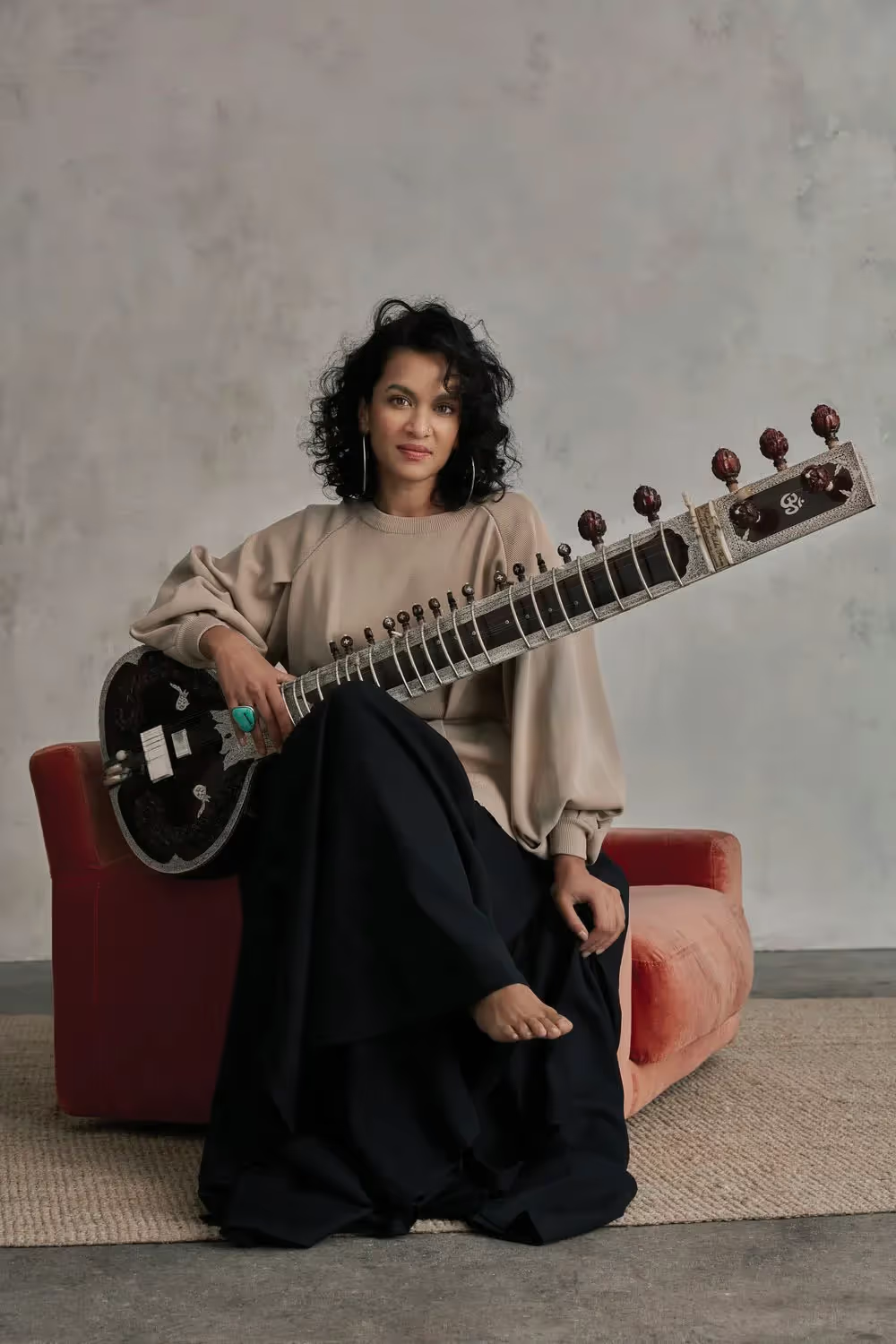
.webp)

